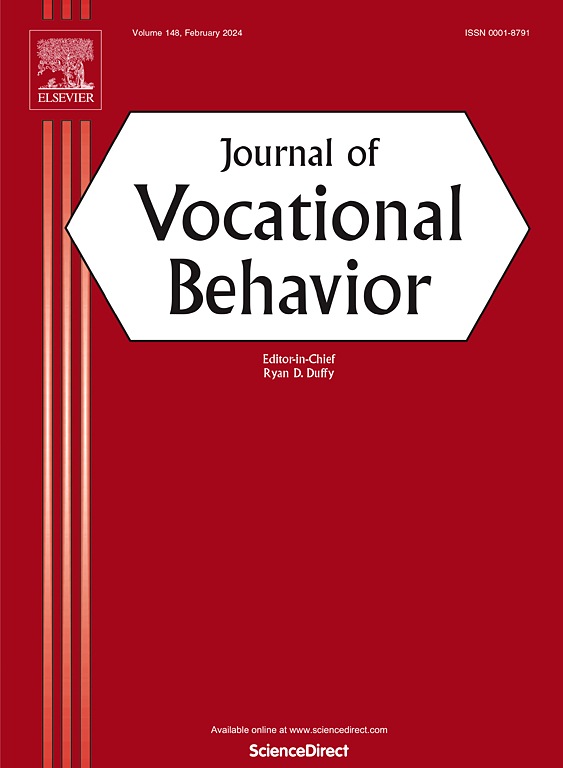放手,拥抱新事物:目标再投入能力如何调节与人工智能互动对职业乐观的影响
IF 5.2
1区 心理学
Q1 PSYCHOLOGY, APPLIED
引用次数: 0
摘要
人工智能(AI)正在迅速进入工作场所,改变人们的工作方式并影响他们的职业生涯。这种整合提出了一个关键问题,即员工需要具备哪些能力,才能对人工智能的崛起和职业生涯的未来保持积极的态度。我们探讨了目标再参与能力如何塑造人类与人工智能交互的影响。在两项实验研究中,我们开发了一个有调节的中介模型,其中目标再投入能力调节了人工智能互动(相对于对照组)通过感知人工智能威胁到职业相关乐观的路径。通过对学生(N = 355)和全职员工(N = 186)的两项实验研究,我们发现个体的目标再投入能力通过人工智能感知威胁调节人工智能互动与职业相关乐观之间的间接关系,因此这种间接影响对低目标再投入能力的人是负的,对高目标再投入能力的人是正的。我们的研究结果强调了随着人工智能重塑工作世界,放弃以前的目标并接受新目标的价值,并强调了在人工智能转型的工作场所中,目标再参与能力对于保持职业乐观至关重要。本文章由计算机程序翻译,如有差异,请以英文原文为准。
Let it go and embrace something new: How goal reengagement capacities moderate the effect of interacting with artificial intelligence on career optimism
Artificial Intelligence (AI) is rapidly entering the workplace, changing the way people work and affecting their careers. This integration raises critical questions about the capabilities employees need to maintain a positive outlook on the rise of AI and the future of their career. We explore how goal reengagement capacities shape the impact of human-AI interaction. In two experimental studies, we develop a moderated mediation model in which goal reengagement capacities moderate the path from AI interaction (vs. a control group) through perceived threat of AI to career-related optimism. Using two experimental studies with students (N = 355) and full-time employees (N = 186), we show that individuals' goal reengagement capacities moderate the indirect relationship between AI interaction and career-related optimism via perceived threat of AI, such that this indirect effect is negative for those with low goal reengagement capacities and positive for those with high goal reengagement capacities. Our findings underscore the value of letting go of previously held goals and embracing new ones as AI reshapes the world of work, and highlight goal reengagement capacities as critical for maintaining career optimism in an AI-transformed workplace.
求助全文
通过发布文献求助,成功后即可免费获取论文全文。
去求助
来源期刊

Journal of Vocational Behavior
PSYCHOLOGY, APPLIED-
CiteScore
13.10
自引率
5.40%
发文量
85
期刊介绍:
The Journal of Vocational Behavior publishes original empirical and theoretical articles offering unique insights into the realms of career choice, career development, and work adjustment across the lifespan. These contributions are not only valuable for academic exploration but also find applications in counseling and career development programs across diverse sectors such as colleges, universities, business, industry, government, and the military.
The primary focus of the journal centers on individual decision-making regarding work and careers, prioritizing investigations into personal career choices rather than organizational or employer-level variables. Example topics encompass a broad range, from initial career choices (e.g., choice of major, initial work or organization selection, organizational attraction) to the development of a career, work transitions, work-family management, and attitudes within the workplace (such as work commitment, multiple role management, and turnover).
 求助内容:
求助内容: 应助结果提醒方式:
应助结果提醒方式:


